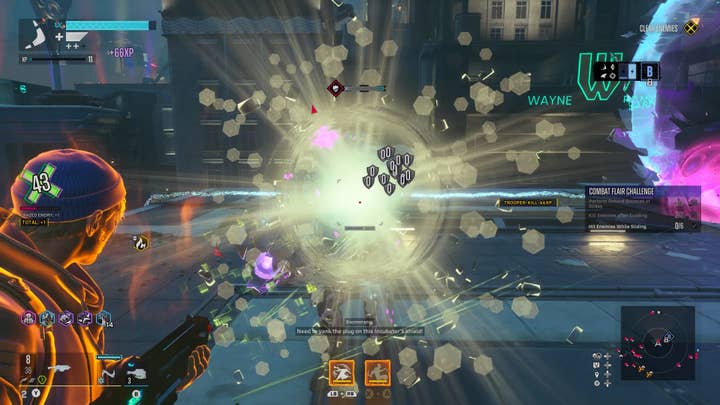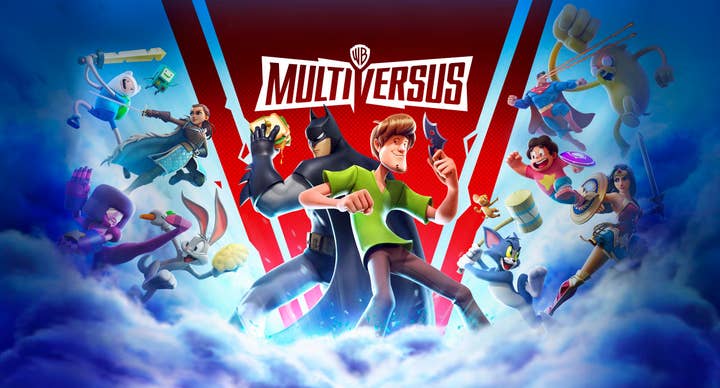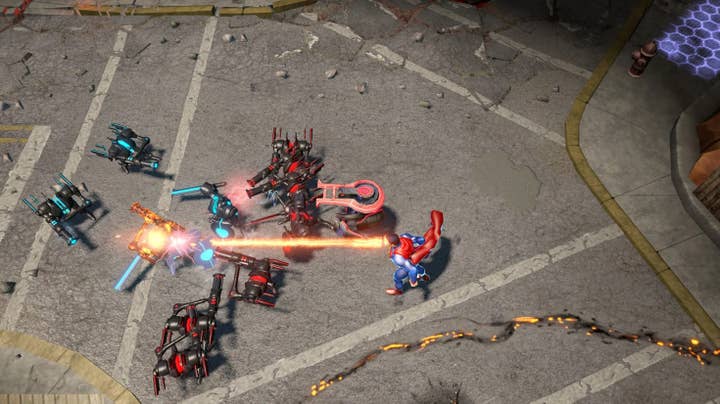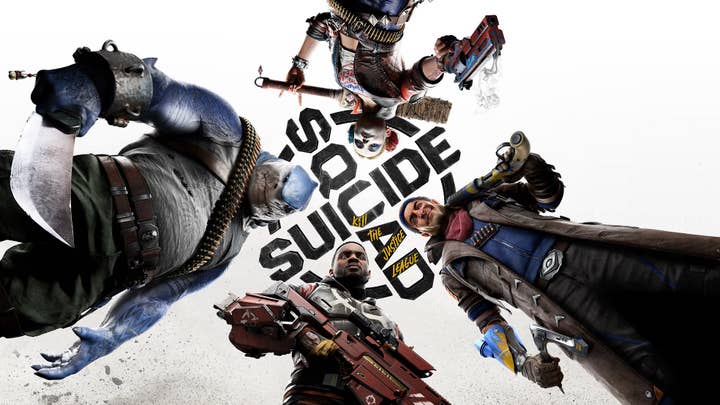WB's push for predictable returns carries real risk | This Week in Business
Hogwarts Legacy publisher's pivot to pursue live service games like Suicide Squad shows the cash is always greener on the other side
Sign up for the GI Daily here to get the biggest news straight to your inbox
This Week in Business is our weekly recap column, a collection of stats and quotes from recent stories presented with a dash of opinion (sometimes more than a dash) and intended to shed light on various trends. Check every Friday for a new entry.
Warner Bros Discovery's gaming division had a pretty great year in 2023, thanks in large part to the success of Hogwarts Legacy, which was the first non-Call of Duty, non-Rockstar-developed game to finish the year atop the Circana/NPD Group's best-sellers list since Rock Band did it in 2008.
Naturally, it wasn't enough. It never is.
Especially now in 2024, when the numbers WB's gaming business is putting up are being compared to the numbers it put up last year when Hogwarts Legacy launched.
QUOTE | "The challenge we've had is our business historically [in games] has been very AAA console based. That's a great business when you have a hit like Harry Potter, it makes the year look amazing. And when you don't have a release or unfortunately we also have disappointments – we just released Suicide Squad this quarter which was not as strong – it just makes it very volatile." – Warner Bros Discovery global streaming and games CEO and president JB Perrette, telling investors this week that the company wants to rely less on AAA console games, and more on mobile and live service titles.
Oh, what a rotten fate it is to have been unusually successful last year. Pity the poor CEO who has to deal with a tough comp!
On paper, Suicide Squad: Kill the Justice League should have been a contender based on pedigree alone
Realistically though, you can understand why the drop-off for WB from last year to this is larger than expected. On paper, Suicide Squad: Kill the Justice League should have been a contender based on pedigree alone. After all, it's the first game from acclaimed studio Rocksteady in eight years, going back to 2016's Batman: Arkham VR. That short novelty aside, the last big game from Rocksteady was 2015's Batman: Arkham Knight.
It's also Rocksteady's long-anticipated foray into the rest of the DC Universe beyond Gotham, showcasing the studio's take on iconic characters like Superman and Wonder Woman.
But even with all that time in the oven, Suicide Squad has disappointed critically and commercially. There's plenty of room for second guessing which decisions hurt the most – one clear suspect would be featuring a Hall of Fame lineup of heroes but only letting players control Harley Quinn, B-lister Deadshot, and C-tier villains like Captain Boomerang and King Shark. But the most obvious and frequently bemoaned culprit is the game's deviation from Rocksteady's Arkham framework in order to build Suicide Squad as a live service title.

Some people might look at Suicide Squad's poor showing and decide that the way forward would be more games following the formula of notable WB hits like Hogwarts Legacy, the Batman-specific Rocksteady titles, and Middle-earth: Shadow of Mordor: take a franchise with a whole lot of fans and then provide them the most immersive possible way to interact with the things they love about that franchise. And given the heavily narrative roots of those franchises, that could lend itself best to single-player games that tell stories with a beginning, middle, and end.
Some people would see that as the takeaway, but apparently not WB executives. After all, Perrette's comments suggest that Suicide Squad's struggles were not due to bad decisions about what kind of game people fundamentally wanted, but due to the inherent volatility of the AAA blockbuster business model that Suicide Squad was so desperately trying to break away from.
I'll be the first to say that the AAA console space (like almost everything else) is not a meritocracy, and sometimes excellent games fail for no fault of their own, just as some seemingly mediocre games seem to stumble backwards into tremendous success by virtue of clever marketing or serendipitous timing. But Suicide Squad's problems were pretty clear from the moment they showed people what the game actually was.
QUOTE | "Ah yes, Captain Boomerang and his signature weapon: S H O T G U N" – YouTube user @FTNChicken on the gameplay reveal trailer. That comment has 7,900 thumbs up. The video itself has only been viewed 742,000 times, so more than 1% of people not only visited the comments (why would anyone do that in the first place?), they actually interacted with them to reaffirm this specific sentiment.
The thing that made Batman: Arkham Asylum such a revelation was that Rocksteady relied on bits of well-established game design and narrative techniques that fit the Batman world, like stealth gameplay and conveying narrative through audio logs of Arkham Asylum patient therapy sessions. And where the well-established game systems of the day didn't suit the world as well, it created new approaches that did, like the detective vision feature or the counter-heavy combat system that breathed life into the game's numerous brawls with henchmen.
With Arkham Asylum, the gameplay was re-worked to fit Batman's world.
With Suicide Squad, right from the start it looked like the DC Universe was being re-worked to fit the gameplay of a live service game in the loot shooter model.
The way Rocksteady changed core traits of the comic characters to make them fit a standard video game mold shows a surprising disregard for authenticity
Captain Boomerang and King Shark rely on guns because the developers built the live service game loop – and by extension, the business model – around guns. They aren't even what I would consider cherished characters, but the way Rocksteady changed core traits of the comic characters to make them fit a standard video game mold shows a surprising disregard for authenticity. You'd hope that anyone in the games industry who had seen the past few decades of gaming film and TV adaptations would have an appreciation for just how much a bit of respect for the source material matters.
In some ways, I can see why WB would look at Suicide Squad's struggles and conclude the problem was something about that specific project rather than the live service strategy itself. If that's the case, then WB figures it just needs to avoid making the same mistakes in the future. Don't let the live service tail wag the cherished IP dog, or something like that.
But judging from Perrette's vision for the future of WB's gaming business, I'm not optimistic.
QUOTE | "So rather than just launching a one-and-done console game, how do we develop a game around for example, Hogwarts Legacy or Harry Potter, that is a live service where people can come in and live and work and build and play in that world on an ongoing basis?" – Perrette on the company's plans for future live service efforts.
A live service game where people live and play sounds fine to me, especially if you mean "live" as in "spend some free time" instead of "permanently inhabit." But a Harry Potter game where people build? Where they work? Those don't sound like Harry Potter player fantasies; they sound like a gaming executive dreaming of having the user base not only make the content but pay you for the privilege of playing it. It's the Roblox model of user exploitation, which continues to appeal to executives despite its decades-long track record of losing money.
Perrette doesn't explicitly say it, but there's reason to think he's looking at something bigger than just a live service Harry Potter game here.
QUOTE | "We see the world and whether it be VR devices, the Vision Pro, the virtual world, who knows exactly how it evolves, but certainly those types of platforms are only going to increase in scale and adoption."
This is actually the first thing he said about the company's gaming business, and apart from the namecheck of Apple's over-priced headset, the whole quote would not have seemed out of place in 2014.
I'm worried WB's vision is not about enabling fans to inhabit their favorite fictional worlds so much as it's about the financialization of every moment they draw breath
Maybe I'm reading too much into this, but any exec talking about the inevitability of "the virtual world" and creating services "where people can come in an live and work and build and play" is basically recreating the 2021 metaverse hype bubble, where the tech industry got so worked up about how everyone would be living in this virtual world but none of them had a great answer for what people would want to do there.
It makes me that much more worried WB's vision is not about enabling fans to inhabit their favorite fictional worlds so much as it's about the financialization of every moment they draw breath. It's the metaverse as a mall that's constantly siphoning away money, a buffet of brands that can be consumed à la carte, completely stripped of their context and narrative meaning. And if that means betraying the essential meaning of a character in order to squeeze a few bucks more out of your catalog of IP, well, we already know WB is game for that.

And then there's WB's Multiversus, a Smash Bros-like live service fighting game featuring a crossover of mostly WB properties like Batman, Scooby-Doo, Gremlins, Bugs Bunny, and, um... LeBron James.
It debuted in August of 2022 in open beta and racked up 20 million players in a single month, but it struggled to keep them engaged and in March of last year WB pulled the beta down and announced the game would return in early 2024 so the developers could work on "the content cadence of new characters, maps, and modes," among other changes.
It looked like WB had a potential live service hit on its hands, but it wasn't prepared to feed the audience's endless hunger for new content after launch. That doesn't speak well of WB management's ability to excel with live service titles, especially considering that hunger has been a know problem for years, particularly given Epic Games' well-documented struggles to stay on the Fortnite content treadmill.
Almost a year after WB announced it was pulling down Multiversus, the game remains offline, although the company began teasing its return this week.
My own read of Multiversus' initial success was that it felt like catching lightning in a bottle – buzz of the kind that game initially generated usually does – and with more than a year between its drop-off and re-launch, I'm skeptical about WB's ability to get that same bolt in there a second time.

The pursuit of predictability
But I think I get where WB's management is coming from.
They look at Fortnite, replete with its incredible engagement metrics, easy cross-brand commercialization (including a number of WB's own properties), user-generated content and metaverse aspirations, and they dream of an evergreen business with the potential to get ever greener.
They look at the mobile industry, where games like Candy Crush Saga have been dominant for a decade. That just doesn't happen in the console space unless you're a live service title like Grand Theft Auto 5/Online or (for some reason) Super Mario Kart 8 Deluxe.
The upside of a traditional Arkham game isn't as limitless as a live service phenomenon like Fortnite
On the other hand, AAA console and PC games are huge investments, and if you're lucky enough to have a hit, the upside of a traditional Arkham game isn't as limitless as a live service phenomenon like Fortnite.
Sure, not every live service game becomes Fortnite and that's even more true of mobile games, but not every Arkham game becomes Arkham City either. Some change the formula too much, and in the process become Gotham Knights. Or they change the formula too little and become Arkham Origins. It's not an exact science, and even a slight slip in quality from one game to the next could mean a more severe dropoff in sales.
The feast-or-famine quality of traditional AAA development has long been a thorn in publishers' sides, and they have always looked with jealousy on anyone who figured out an effective way to make the company's revenue chart look like one long upward slope instead of an endless series of peaks and valleys.
We saw it with MMOs when Blizzard launched 2004's genre-defining World of Warcraft, everybody did the back-of-the-envelope math on millions of subscribers paying $15 to play a game each and every month, and suddenly every new game announcement was [Franchise] Online.
Lots of them had popular licenses attached (Marvel, Warhammer, Star Wars, Star Trek). Lots of them didn't (Tabula Rasa, City of Heroes, Stargate).
WB was actually part of that early MMO stampede. It made The Matrix Online and ran the thing for literally three months before deciding it would be better off selling the operation (and the rights to a DC MMO) to Sony Online Entertainment and putting developer Monolith Productions to work on more traditional single-player and small-scale multiplayer games instead. You know, like 2014 Game of the Year award winner Middle-earth: Shadow of Mordor.
WB also acquired MMO specialist Turbine in 2010, adding Dungeon & Dragons Online and The Lord of the Rings Online to its roster of games. But even with two viable and ongoing free-to-play live service titles of its own, WB was more interested in the trend of the moment, free-to-play MOBAs like League of Legends, so it had Turbine make one using the DC Universe properties.
That game, Infinite Crisis, formally launched in March of 2015. As far as live service games go, Infinite Crisis was way ahead of its time, by which I mean it only lasted two months before they said it was shutting down.

I don't want to pick on WB too much because publishers of all kinds have longed to create predictably growing revenues year-in and year-out instead of accepting the wild swings between good years and bad that was a staple of the AAA console and PC world for so long. That desire for more uniform income has played a part in a number of trends over the years, including annualized releases, episodic games, and catalog subscription services.
In its own quest for more reliable revenue, WB is proposing to eschew the type of game that has produced its greatest successes in favor of a different kind of console and PC game that many of its existing fans have a strong aversion to (as evidenced by the reception to Suicide Squad), and one that is an especially poor fit for the deeply narrative origins of three of the four billion-dollar franchises that drive its games business: Game of Thrones, Harry Potter, DC Comics, and Mortal Kombat. (With all due respect to Mortal Kombat, one of these things is not like the others.)
But the route WB is taking to avoid volatility is by no means a safer option. It is pivoting the company and its studios to a type of game it hasn't enjoyed nearly as much success with.
Anyone can make a live service or a mobile game. And judging by WB's frequent deals to put its characters in Fortnite, anyone else can even make a live service or mobile games featuring WB's IP.
What others can't do is make an Arkham Asylum, a Hogwarts Legacy, or a Shadow of Mordor. Even among successful AAA studios, hits like those are rare.
If the goal is to create a more predictable business unburdened by the volatility such titles can create, I must concede WB's strategy might do the trick. After all, one way to avoid peaks and valleys in your sales chart is to just get rid of all those troublesome peaks.
The rest of the week in review
STAT | 9 – The number of features we ran as part of our South Africa Games Week coverage. If you want to familiarize yourself with the big companies in the market and the unique advantages they have and challenges they face, our round-up article is a great place to start.
QUOTE | "The number one [strength] for me is just the immense talent that is here, and how more and more studios are getting funding. There is a lot more focus and a lot more information coming out both from South Africa and the continent in terms of the market that's available, and the developers." - RocketRide Games' Limpho Moeti on the South African development scene's biggest advantage.
QUOTE | "Access to dev kits – we sometimes have to [almost] smuggle them in. That's an open secret, because if we do it the right way, they get stuck in customs for months on end because someone, somewhere mislabelled a VR dev kit as a headset, and they go, 'You're committing fraud.' And because of that, some platforms will not send dev kits here." – In an interview about the studio's recent acquisition by Annapurna Interactive, 24 Bit Games COO Pieter Koornhof details one of the possibly unexpected challenges facing South African developers.
QUOTE | "There are a lot of studios in South Africa [but] there are only really six major ones, and all of them are run and owned by white men. And I think that has a large knock-on effect of the inability to take that risk. I'm not going to tell their stories, but a lot of my ability to do Nyamakop is based purely on privilege and generational wealth, and the crazy safety net you have." – Nyamakop CEO and creative director Ben Myres notes that even in a country with more than 80% of the people are Black, the games industry struggles with diversity.
QUOTE | "There's a lot of right in South Africa, otherwise Free Lives wouldn't be here. If you can get going, it is very ideal to stay in South Africa." - Free Lives managing director Dominique Gawlowski says the quality of life in South Africa is "unbeatable." (And the exchange rate when your income is dollars and your expenditures are in rands isn't too shabby, either.)
QUOTE | "AI does not hold the answers for this level of composition. It's a tool and can be very helpful, but it lacks the capacity for higher-order rap skills, complex storytelling, extraction, and multi-figurative language." – Glow Up Games co-founder Latoya Peterson discusses the limitations of AI in a DICE Summit presentation.
STAT | Ten to 20 years – According to IDG Consulting and Strategic Game Consulting, game remakes that follow ten to 20 years after the original sell best, on average. The idea is that you need enough time to pass that hardware and software advancements can address the original game's pain points, but not so much time that the game feels too dated compared to modern titles.
QUOTE | "In terminating Epic's developer account, Apple is taking out one of the largest potential competitors to the Apple App Store. They are undermining our ability to be a viable competitor and they are showing other developers what happens when you try to compete with Apple or are critical of their unfair practices." – Epic takes exception to Apple blocking its bid to launch an Epic Games Store on iOS devices despite the EU's Digital Markets Act mandating it open the platform up to alternative app stores.
Apple explained that Epic is "verifiably untrustworthy," which, touché.
STAT | $19,000 a year – Capcom's starting pay for new graduate hires. It announced this week it will increase that by 28% starting in fiscal 2025 to the still-not-terribly-impressive amount of $24,000.
STAT | $28,000 a year – About what I made as a new graduate hire in 2000 while working at a suburban Chicago newspaper that was most definitely not selling more than 40 million games a year like Capcom does. Given inflation, that's like $50,000 in 2024 dollars, or twice what Capcom's graduate hires will be making next year.
The lesson, as always, is that the financially responsible decision is to pursue a career in print journalism.
STAT | $2.4 million – Tropic Haze, developer of the Switch emulator Yuzu, quickly settled a lawsuit brought against it by Nintendo, agreeing to stop all development on its emulators.
QUOTE | "It's with a heavy heart I announce that Rooster Teeth is shutting down due to challenges facing digital media resulting from fundamental shifts in consumer behavior and monetization across platforms, advertising, and patronage." – In an email to staff this week, Rooster Teeth general manager Jordan Levin announces that parent WB Discovery is shutting the brand down, with about 150 losing their full-time jobs as a result.
QUOTE | "We fought hard to keep the team going for most of last year. During that time, we watched the growing momentum of layoffs and studio closures. Ultimately, we ran out of money and were forced to make some unhappy decisions." – Torus Games founder Bill McIntosh confirms that the Australian developer that worked on Lego 2K Drive and World War Z has laid off all its staff and will make a decision on whether or not it completely shuts down later this year.
QUOTE | "So long, until we meet again." – Spearhead Games co-founders Atul Mehra and Malik Boukhira, in a note announcing that the studio stopped production on its project Unforetold: Witchstone and laid off most of its staff.
QUOTE | "This shit sucks." – Tails Noir developer Eggnut Games announces that it is halting operations due to funding problems.
STAT | More than 100 – The number of cute pet pictures in our latest Creature Comforts column, in case you need a pick-me-up in light of, uh, everything.
Sign up for the GI Daily here to get the biggest news straight to your inbox









